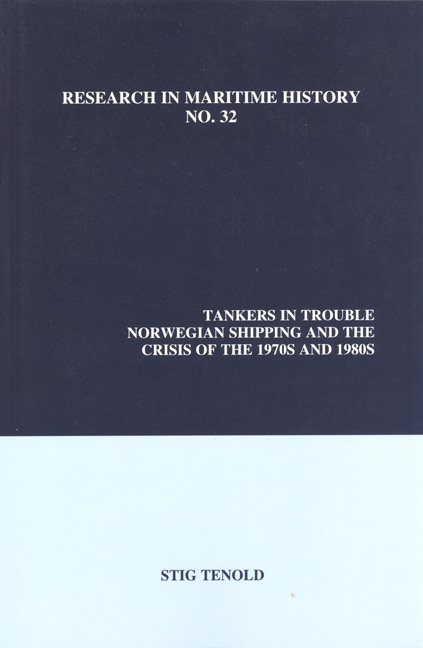Book contents
- Frontmatter
- Table of Contents
- List of Tables in the Text
- List of Illustrations
- Preface
- Chapter 1 Introduction
- Chapter 2 The Shipping Market after World War II
- Chapter 3 The Basis of the Tanker Crisis
- Chapter 4 The Contagion and Short-term Effects of the Crisis
- Chapter 5 Stage Two of the Crisis and the Long-term Changes
- Chapter 6 The Basis for the Crisis in Norwegian Shipping
- Chapter 7 Structural Transformations in Norwegian Shipping
- Chapter 8 The Fates of Four Norwegian Shipowners
- Chapter 9 Conclusion
- Appendices
- Bibliography: Select Bibliography
Chapter 4 - The Contagion and Short-term Effects of the Crisis
- Frontmatter
- Table of Contents
- List of Tables in the Text
- List of Illustrations
- Preface
- Chapter 1 Introduction
- Chapter 2 The Shipping Market after World War II
- Chapter 3 The Basis of the Tanker Crisis
- Chapter 4 The Contagion and Short-term Effects of the Crisis
- Chapter 5 Stage Two of the Crisis and the Long-term Changes
- Chapter 6 The Basis for the Crisis in Norwegian Shipping
- Chapter 7 Structural Transformations in Norwegian Shipping
- Chapter 8 The Fates of Four Norwegian Shipowners
- Chapter 9 Conclusion
- Appendices
- Bibliography: Select Bibliography
Summary
In the postwar period the various segments of the shipping market were increasingly served by specialised vessels. But the reduction in the number of general-purpose ships does not imply that the various shipping segments were isolated from each other. Indeed, the problems in the tanker sector spilled over relatively rapidly into other parts of the shipping market.
Two mechanisms on the supply side - the inflow of combination carriers and the eagerness of shipyards to build new bulk ships - explain the spread of the crisis from tankers to the dry bulk sector. At the same time, it is likely that a recession would have occurred in the latter even without the tanker problem due to a slowdown in world manufacturing. The situation was analogous to the tanker market: the recession would have been particularly strong because those involved expected continuing demand growth.
In the dry bulk market, the immediate effect of the oil price hike was a strong increase in the price of bunkers. Again, this particularly affected owners operating relatively fuel-inefficient vessels, such as older ships or large ones with turbine engines. Fortunately, due to differences in the size distribution, turbine-driven vessels were less important in the dry bulk than in the tanker sector.
A more fundamental effect of the oil price increase was the long-term influence on the demand for dry bulk transport. The increased price of oil amplified the downward business cycles that were already evident in the world economy. Due to the strong correlation between the demand for dry bulk transport and manufacturing, the recession had negative consequences for bulk transport demand.
The oil price hike was one of the main causes of the international economic recession of the 1970s. It is possible, however, to find some signs of disequilibrium in the world economy before oil prices were raised, such as problems in international monetary relations. The world economy was struck by high inflation, primarily in connection with increasing prices for raw materials and wages. In addition, the stability and predictability of international trade relations were reduced because of a loss of confidence in some of the world's major currencies.
- Type
- Chapter
- Information
- Tankers in TroubleNorwegian Shipping and the Crisis of the 1970s and 1980s, pp. 65 - 84Publisher: Liverpool University PressPrint publication year: 2006



